HR5001: The Role of Women in African Work: Challenges and Prospects
VerifiedAdded on 2023/06/12
|13
|3587
|496
Essay
AI Summary
This essay examines the role of women in African workplaces, highlighting the unique challenges they encounter from pre-employment to career advancement. It addresses the patriarchal norms that limit women's participation in the workforce, the educational difficulties they face in pursuing their desired careers, and the obstacles hindering their professional growth. The essay also discusses the impact of societal perceptions and the lack of supportive labor policies on women's employment opportunities. It further explores the scarcity of female role models in certain fields and the discrimination women face in educational settings and workplaces. This resource is available on Desklib, a platform offering a wealth of academic materials and study tools for students.
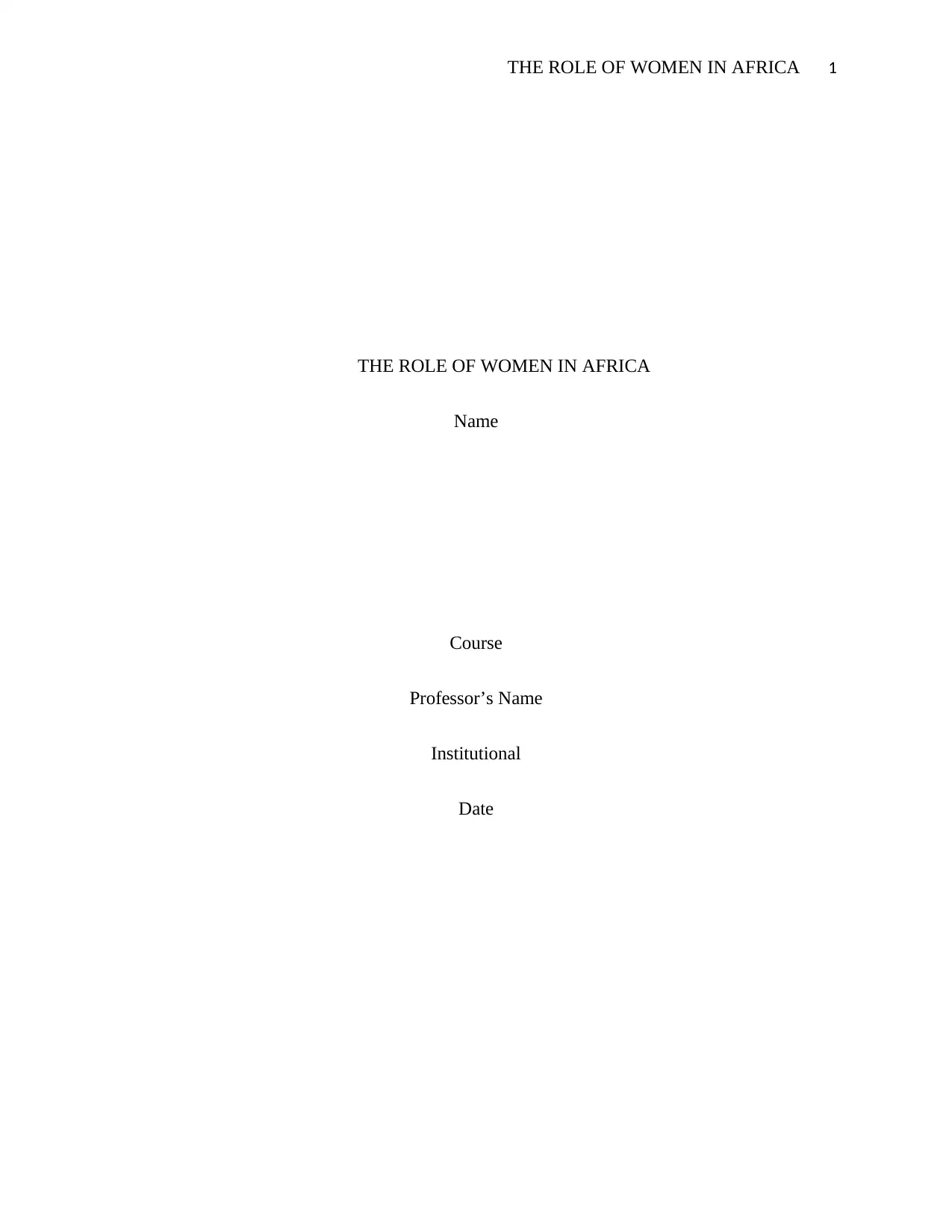
THE ROLE OF WOMEN IN AFRICA 1
THE ROLE OF WOMEN IN AFRICA
Name
Course
Professor’s Name
Institutional
Date
THE ROLE OF WOMEN IN AFRICA
Name
Course
Professor’s Name
Institutional
Date
Paraphrase This Document
Need a fresh take? Get an instant paraphrase of this document with our AI Paraphraser
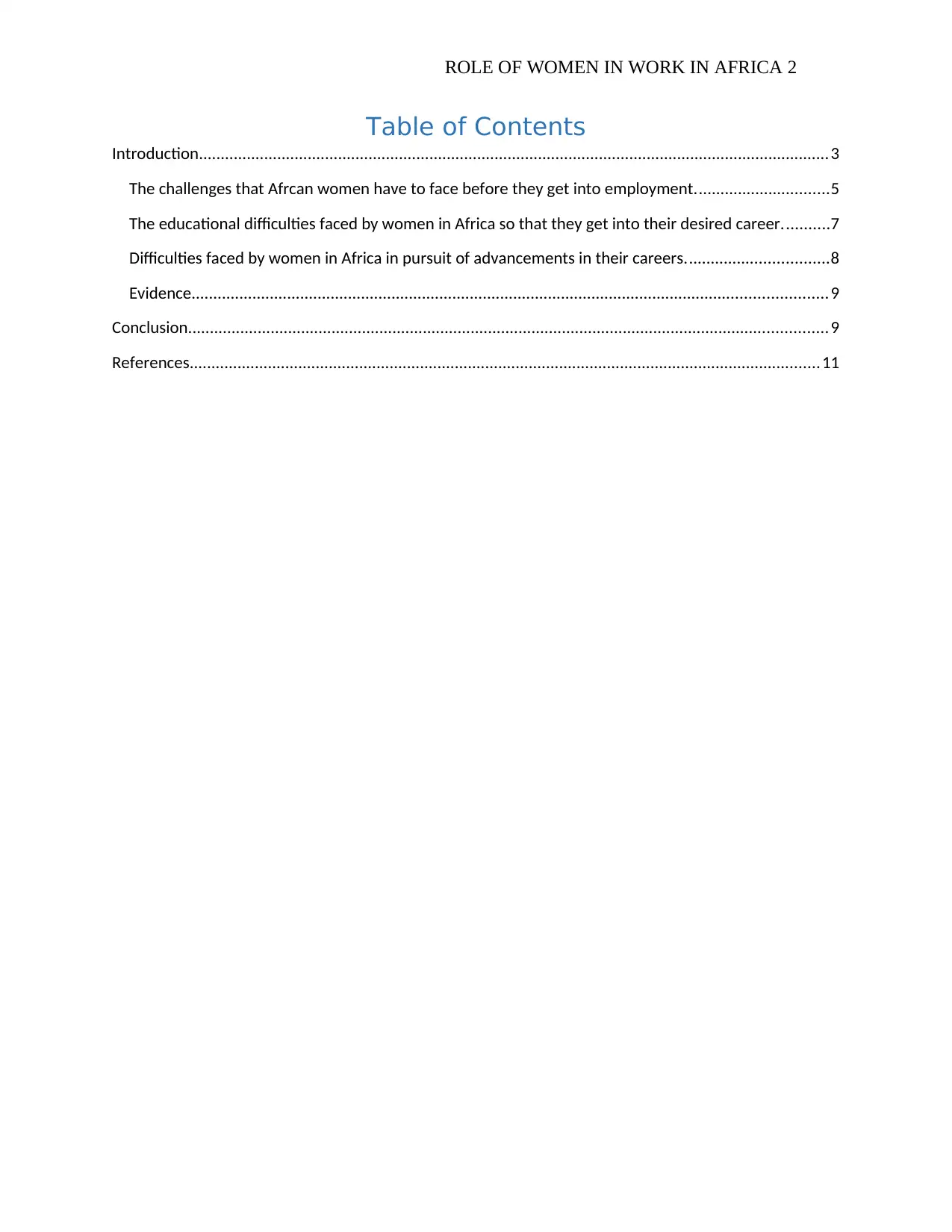
ROLE OF WOMEN IN WORK IN AFRICA 2
Table of Contents
Introduction.................................................................................................................................................3
The challenges that Afrcan women have to face before they get into employment...............................5
The educational difficulties faced by women in Africa so that they get into their desired career...........7
Difficulties faced by women in Africa in pursuit of advancements in their careers.................................8
Evidence..................................................................................................................................................9
Conclusion...................................................................................................................................................9
References.................................................................................................................................................11
Table of Contents
Introduction.................................................................................................................................................3
The challenges that Afrcan women have to face before they get into employment...............................5
The educational difficulties faced by women in Africa so that they get into their desired career...........7
Difficulties faced by women in Africa in pursuit of advancements in their careers.................................8
Evidence..................................................................................................................................................9
Conclusion...................................................................................................................................................9
References.................................................................................................................................................11
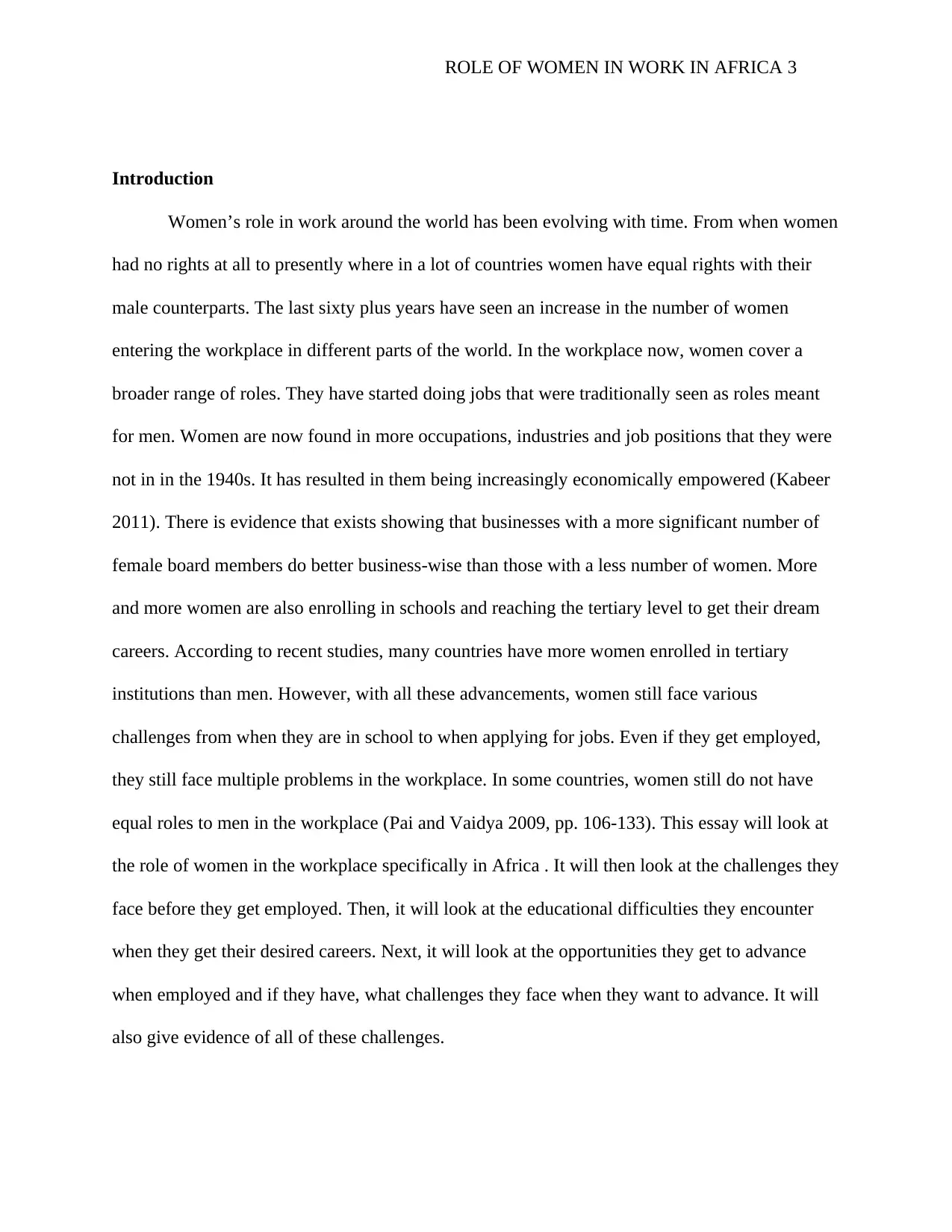
ROLE OF WOMEN IN WORK IN AFRICA 3
Introduction
Women’s role in work around the world has been evolving with time. From when women
had no rights at all to presently where in a lot of countries women have equal rights with their
male counterparts. The last sixty plus years have seen an increase in the number of women
entering the workplace in different parts of the world. In the workplace now, women cover a
broader range of roles. They have started doing jobs that were traditionally seen as roles meant
for men. Women are now found in more occupations, industries and job positions that they were
not in in the 1940s. It has resulted in them being increasingly economically empowered (Kabeer
2011). There is evidence that exists showing that businesses with a more significant number of
female board members do better business-wise than those with a less number of women. More
and more women are also enrolling in schools and reaching the tertiary level to get their dream
careers. According to recent studies, many countries have more women enrolled in tertiary
institutions than men. However, with all these advancements, women still face various
challenges from when they are in school to when applying for jobs. Even if they get employed,
they still face multiple problems in the workplace. In some countries, women still do not have
equal roles to men in the workplace (Pai and Vaidya 2009, pp. 106-133). This essay will look at
the role of women in the workplace specifically in Africa . It will then look at the challenges they
face before they get employed. Then, it will look at the educational difficulties they encounter
when they get their desired careers. Next, it will look at the opportunities they get to advance
when employed and if they have, what challenges they face when they want to advance. It will
also give evidence of all of these challenges.
Introduction
Women’s role in work around the world has been evolving with time. From when women
had no rights at all to presently where in a lot of countries women have equal rights with their
male counterparts. The last sixty plus years have seen an increase in the number of women
entering the workplace in different parts of the world. In the workplace now, women cover a
broader range of roles. They have started doing jobs that were traditionally seen as roles meant
for men. Women are now found in more occupations, industries and job positions that they were
not in in the 1940s. It has resulted in them being increasingly economically empowered (Kabeer
2011). There is evidence that exists showing that businesses with a more significant number of
female board members do better business-wise than those with a less number of women. More
and more women are also enrolling in schools and reaching the tertiary level to get their dream
careers. According to recent studies, many countries have more women enrolled in tertiary
institutions than men. However, with all these advancements, women still face various
challenges from when they are in school to when applying for jobs. Even if they get employed,
they still face multiple problems in the workplace. In some countries, women still do not have
equal roles to men in the workplace (Pai and Vaidya 2009, pp. 106-133). This essay will look at
the role of women in the workplace specifically in Africa . It will then look at the challenges they
face before they get employed. Then, it will look at the educational difficulties they encounter
when they get their desired careers. Next, it will look at the opportunities they get to advance
when employed and if they have, what challenges they face when they want to advance. It will
also give evidence of all of these challenges.
⊘ This is a preview!⊘
Do you want full access?
Subscribe today to unlock all pages.

Trusted by 1+ million students worldwide
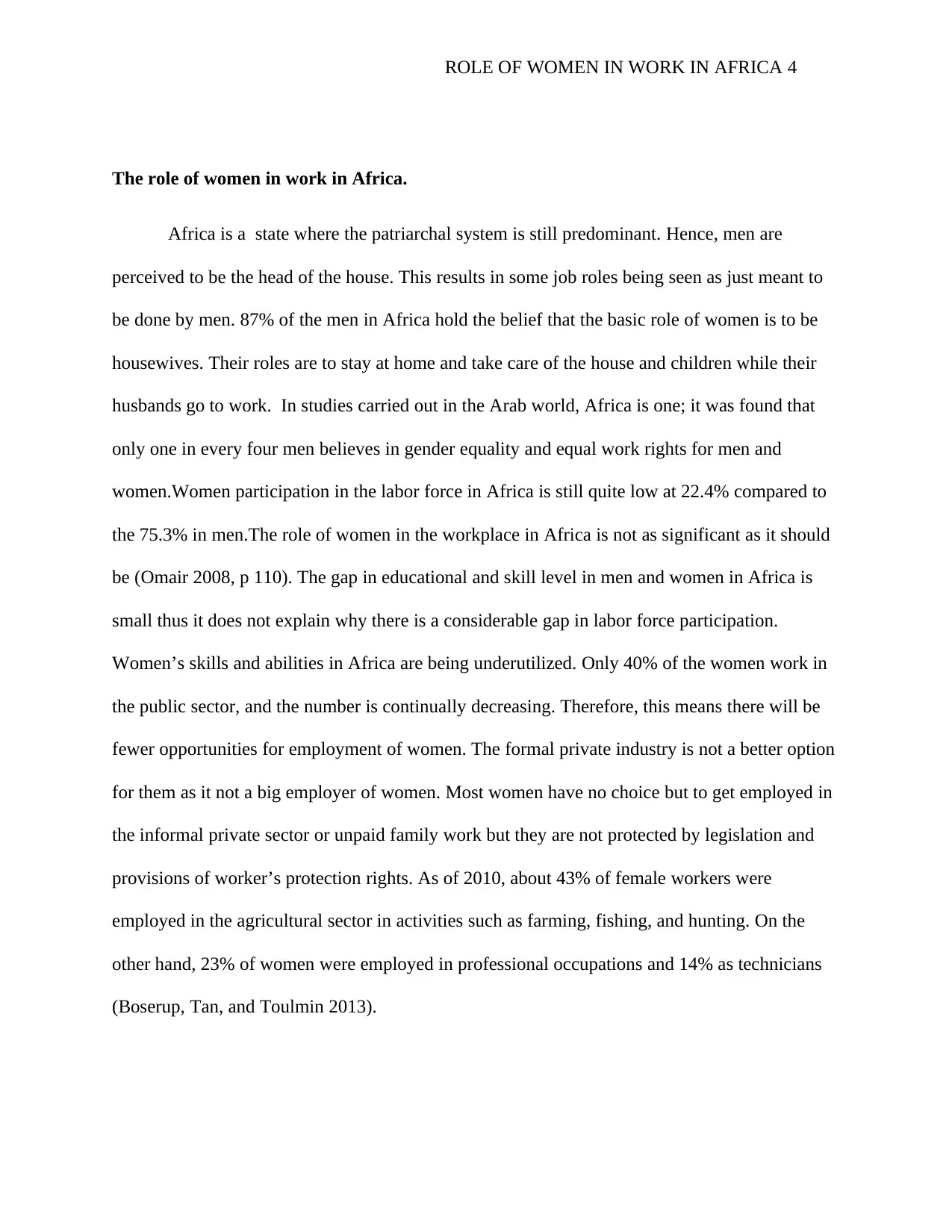
ROLE OF WOMEN IN WORK IN AFRICA 4
The role of women in work in Africa.
Africa is a state where the patriarchal system is still predominant. Hence, men are
perceived to be the head of the house. This results in some job roles being seen as just meant to
be done by men. 87% of the men in Africa hold the belief that the basic role of women is to be
housewives. Their roles are to stay at home and take care of the house and children while their
husbands go to work. In studies carried out in the Arab world, Africa is one; it was found that
only one in every four men believes in gender equality and equal work rights for men and
women.Women participation in the labor force in Africa is still quite low at 22.4% compared to
the 75.3% in men.The role of women in the workplace in Africa is not as significant as it should
be (Omair 2008, p 110). The gap in educational and skill level in men and women in Africa is
small thus it does not explain why there is a considerable gap in labor force participation.
Women’s skills and abilities in Africa are being underutilized. Only 40% of the women work in
the public sector, and the number is continually decreasing. Therefore, this means there will be
fewer opportunities for employment of women. The formal private industry is not a better option
for them as it not a big employer of women. Most women have no choice but to get employed in
the informal private sector or unpaid family work but they are not protected by legislation and
provisions of worker’s protection rights. As of 2010, about 43% of female workers were
employed in the agricultural sector in activities such as farming, fishing, and hunting. On the
other hand, 23% of women were employed in professional occupations and 14% as technicians
(Boserup, Tan, and Toulmin 2013).
The role of women in work in Africa.
Africa is a state where the patriarchal system is still predominant. Hence, men are
perceived to be the head of the house. This results in some job roles being seen as just meant to
be done by men. 87% of the men in Africa hold the belief that the basic role of women is to be
housewives. Their roles are to stay at home and take care of the house and children while their
husbands go to work. In studies carried out in the Arab world, Africa is one; it was found that
only one in every four men believes in gender equality and equal work rights for men and
women.Women participation in the labor force in Africa is still quite low at 22.4% compared to
the 75.3% in men.The role of women in the workplace in Africa is not as significant as it should
be (Omair 2008, p 110). The gap in educational and skill level in men and women in Africa is
small thus it does not explain why there is a considerable gap in labor force participation.
Women’s skills and abilities in Africa are being underutilized. Only 40% of the women work in
the public sector, and the number is continually decreasing. Therefore, this means there will be
fewer opportunities for employment of women. The formal private industry is not a better option
for them as it not a big employer of women. Most women have no choice but to get employed in
the informal private sector or unpaid family work but they are not protected by legislation and
provisions of worker’s protection rights. As of 2010, about 43% of female workers were
employed in the agricultural sector in activities such as farming, fishing, and hunting. On the
other hand, 23% of women were employed in professional occupations and 14% as technicians
(Boserup, Tan, and Toulmin 2013).
Paraphrase This Document
Need a fresh take? Get an instant paraphrase of this document with our AI Paraphraser
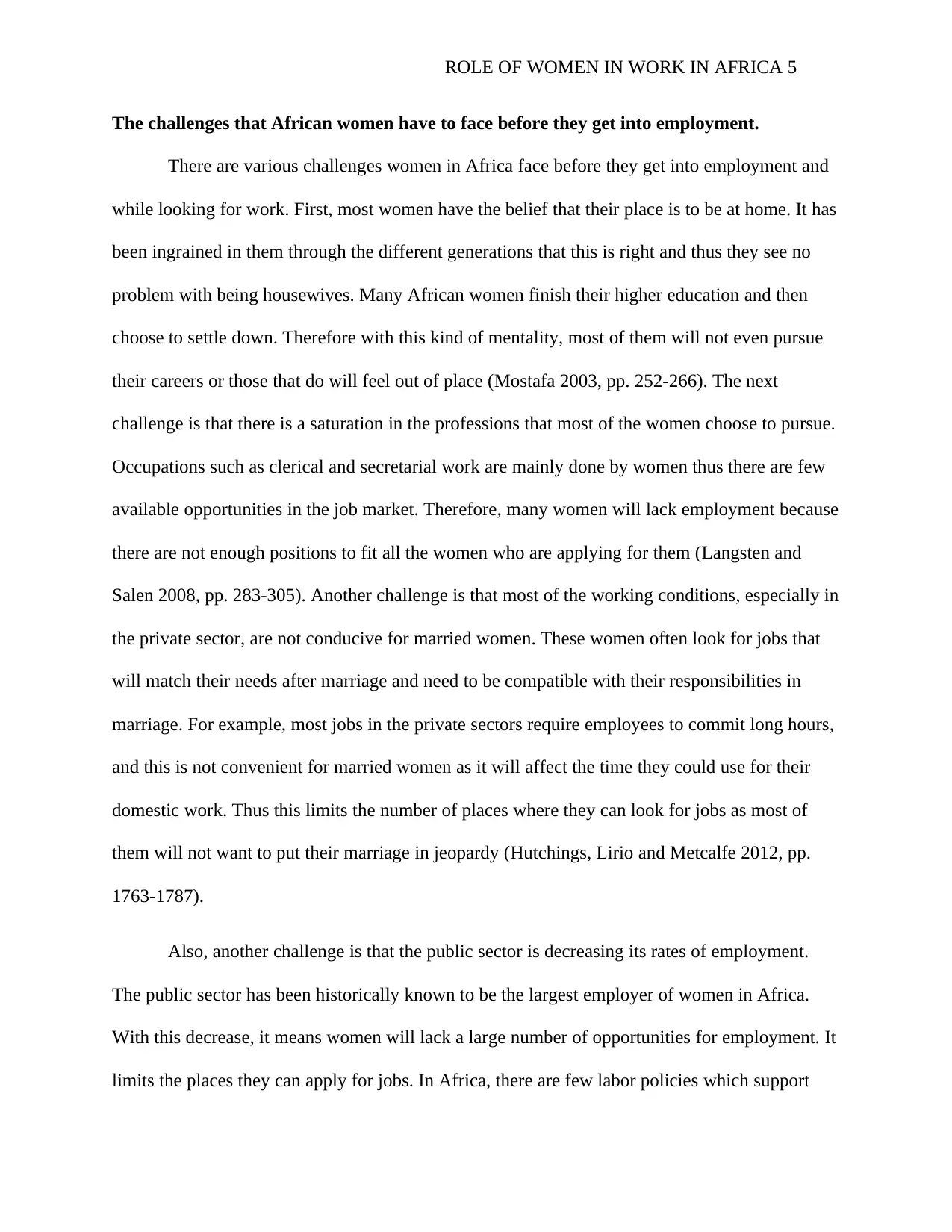
ROLE OF WOMEN IN WORK IN AFRICA 5
The challenges that African women have to face before they get into employment.
There are various challenges women in Africa face before they get into employment and
while looking for work. First, most women have the belief that their place is to be at home. It has
been ingrained in them through the different generations that this is right and thus they see no
problem with being housewives. Many African women finish their higher education and then
choose to settle down. Therefore with this kind of mentality, most of them will not even pursue
their careers or those that do will feel out of place (Mostafa 2003, pp. 252-266). The next
challenge is that there is a saturation in the professions that most of the women choose to pursue.
Occupations such as clerical and secretarial work are mainly done by women thus there are few
available opportunities in the job market. Therefore, many women will lack employment because
there are not enough positions to fit all the women who are applying for them (Langsten and
Salen 2008, pp. 283-305). Another challenge is that most of the working conditions, especially in
the private sector, are not conducive for married women. These women often look for jobs that
will match their needs after marriage and need to be compatible with their responsibilities in
marriage. For example, most jobs in the private sectors require employees to commit long hours,
and this is not convenient for married women as it will affect the time they could use for their
domestic work. Thus this limits the number of places where they can look for jobs as most of
them will not want to put their marriage in jeopardy (Hutchings, Lirio and Metcalfe 2012, pp.
1763-1787).
Also, another challenge is that the public sector is decreasing its rates of employment.
The public sector has been historically known to be the largest employer of women in Africa.
With this decrease, it means women will lack a large number of opportunities for employment. It
limits the places they can apply for jobs. In Africa, there are few labor policies which support
The challenges that African women have to face before they get into employment.
There are various challenges women in Africa face before they get into employment and
while looking for work. First, most women have the belief that their place is to be at home. It has
been ingrained in them through the different generations that this is right and thus they see no
problem with being housewives. Many African women finish their higher education and then
choose to settle down. Therefore with this kind of mentality, most of them will not even pursue
their careers or those that do will feel out of place (Mostafa 2003, pp. 252-266). The next
challenge is that there is a saturation in the professions that most of the women choose to pursue.
Occupations such as clerical and secretarial work are mainly done by women thus there are few
available opportunities in the job market. Therefore, many women will lack employment because
there are not enough positions to fit all the women who are applying for them (Langsten and
Salen 2008, pp. 283-305). Another challenge is that most of the working conditions, especially in
the private sector, are not conducive for married women. These women often look for jobs that
will match their needs after marriage and need to be compatible with their responsibilities in
marriage. For example, most jobs in the private sectors require employees to commit long hours,
and this is not convenient for married women as it will affect the time they could use for their
domestic work. Thus this limits the number of places where they can look for jobs as most of
them will not want to put their marriage in jeopardy (Hutchings, Lirio and Metcalfe 2012, pp.
1763-1787).
Also, another challenge is that the public sector is decreasing its rates of employment.
The public sector has been historically known to be the largest employer of women in Africa.
With this decrease, it means women will lack a large number of opportunities for employment. It
limits the places they can apply for jobs. In Africa, there are few labor policies which support
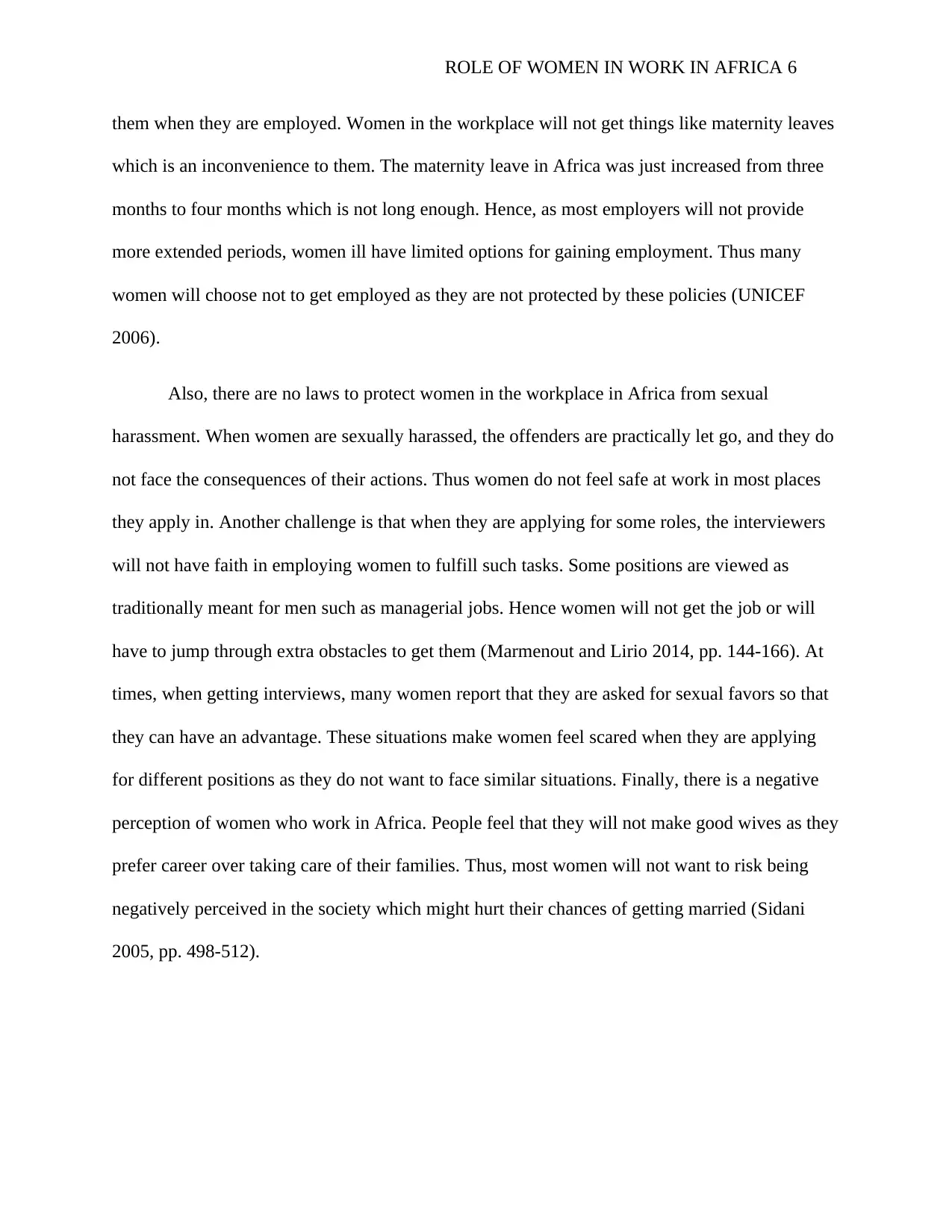
ROLE OF WOMEN IN WORK IN AFRICA 6
them when they are employed. Women in the workplace will not get things like maternity leaves
which is an inconvenience to them. The maternity leave in Africa was just increased from three
months to four months which is not long enough. Hence, as most employers will not provide
more extended periods, women ill have limited options for gaining employment. Thus many
women will choose not to get employed as they are not protected by these policies (UNICEF
2006).
Also, there are no laws to protect women in the workplace in Africa from sexual
harassment. When women are sexually harassed, the offenders are practically let go, and they do
not face the consequences of their actions. Thus women do not feel safe at work in most places
they apply in. Another challenge is that when they are applying for some roles, the interviewers
will not have faith in employing women to fulfill such tasks. Some positions are viewed as
traditionally meant for men such as managerial jobs. Hence women will not get the job or will
have to jump through extra obstacles to get them (Marmenout and Lirio 2014, pp. 144-166). At
times, when getting interviews, many women report that they are asked for sexual favors so that
they can have an advantage. These situations make women feel scared when they are applying
for different positions as they do not want to face similar situations. Finally, there is a negative
perception of women who work in Africa. People feel that they will not make good wives as they
prefer career over taking care of their families. Thus, most women will not want to risk being
negatively perceived in the society which might hurt their chances of getting married (Sidani
2005, pp. 498-512).
them when they are employed. Women in the workplace will not get things like maternity leaves
which is an inconvenience to them. The maternity leave in Africa was just increased from three
months to four months which is not long enough. Hence, as most employers will not provide
more extended periods, women ill have limited options for gaining employment. Thus many
women will choose not to get employed as they are not protected by these policies (UNICEF
2006).
Also, there are no laws to protect women in the workplace in Africa from sexual
harassment. When women are sexually harassed, the offenders are practically let go, and they do
not face the consequences of their actions. Thus women do not feel safe at work in most places
they apply in. Another challenge is that when they are applying for some roles, the interviewers
will not have faith in employing women to fulfill such tasks. Some positions are viewed as
traditionally meant for men such as managerial jobs. Hence women will not get the job or will
have to jump through extra obstacles to get them (Marmenout and Lirio 2014, pp. 144-166). At
times, when getting interviews, many women report that they are asked for sexual favors so that
they can have an advantage. These situations make women feel scared when they are applying
for different positions as they do not want to face similar situations. Finally, there is a negative
perception of women who work in Africa. People feel that they will not make good wives as they
prefer career over taking care of their families. Thus, most women will not want to risk being
negatively perceived in the society which might hurt their chances of getting married (Sidani
2005, pp. 498-512).
⊘ This is a preview!⊘
Do you want full access?
Subscribe today to unlock all pages.

Trusted by 1+ million students worldwide
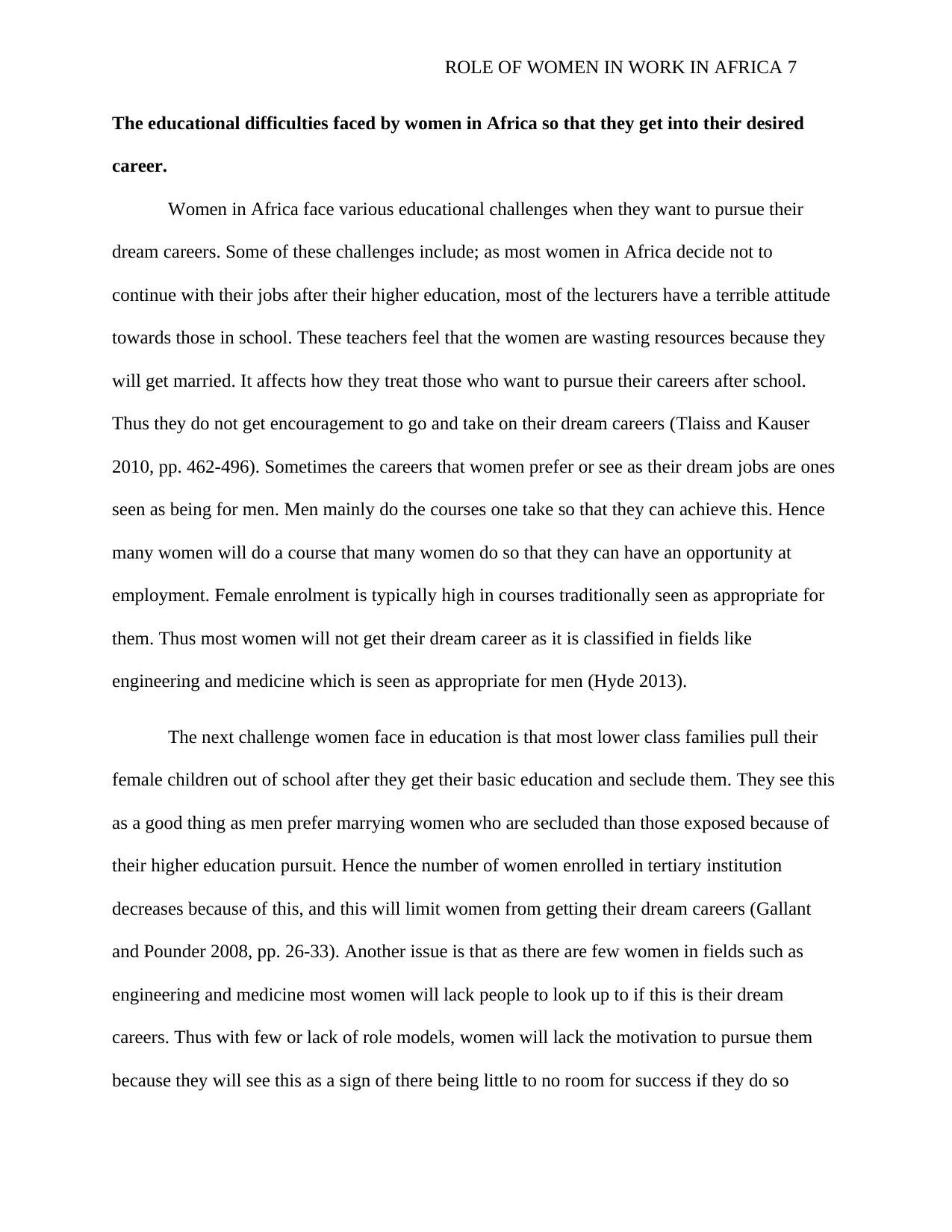
ROLE OF WOMEN IN WORK IN AFRICA 7
The educational difficulties faced by women in Africa so that they get into their desired
career.
Women in Africa face various educational challenges when they want to pursue their
dream careers. Some of these challenges include; as most women in Africa decide not to
continue with their jobs after their higher education, most of the lecturers have a terrible attitude
towards those in school. These teachers feel that the women are wasting resources because they
will get married. It affects how they treat those who want to pursue their careers after school.
Thus they do not get encouragement to go and take on their dream careers (Tlaiss and Kauser
2010, pp. 462-496). Sometimes the careers that women prefer or see as their dream jobs are ones
seen as being for men. Men mainly do the courses one take so that they can achieve this. Hence
many women will do a course that many women do so that they can have an opportunity at
employment. Female enrolment is typically high in courses traditionally seen as appropriate for
them. Thus most women will not get their dream career as it is classified in fields like
engineering and medicine which is seen as appropriate for men (Hyde 2013).
The next challenge women face in education is that most lower class families pull their
female children out of school after they get their basic education and seclude them. They see this
as a good thing as men prefer marrying women who are secluded than those exposed because of
their higher education pursuit. Hence the number of women enrolled in tertiary institution
decreases because of this, and this will limit women from getting their dream careers (Gallant
and Pounder 2008, pp. 26-33). Another issue is that as there are few women in fields such as
engineering and medicine most women will lack people to look up to if this is their dream
careers. Thus with few or lack of role models, women will lack the motivation to pursue them
because they will see this as a sign of there being little to no room for success if they do so
The educational difficulties faced by women in Africa so that they get into their desired
career.
Women in Africa face various educational challenges when they want to pursue their
dream careers. Some of these challenges include; as most women in Africa decide not to
continue with their jobs after their higher education, most of the lecturers have a terrible attitude
towards those in school. These teachers feel that the women are wasting resources because they
will get married. It affects how they treat those who want to pursue their careers after school.
Thus they do not get encouragement to go and take on their dream careers (Tlaiss and Kauser
2010, pp. 462-496). Sometimes the careers that women prefer or see as their dream jobs are ones
seen as being for men. Men mainly do the courses one take so that they can achieve this. Hence
many women will do a course that many women do so that they can have an opportunity at
employment. Female enrolment is typically high in courses traditionally seen as appropriate for
them. Thus most women will not get their dream career as it is classified in fields like
engineering and medicine which is seen as appropriate for men (Hyde 2013).
The next challenge women face in education is that most lower class families pull their
female children out of school after they get their basic education and seclude them. They see this
as a good thing as men prefer marrying women who are secluded than those exposed because of
their higher education pursuit. Hence the number of women enrolled in tertiary institution
decreases because of this, and this will limit women from getting their dream careers (Gallant
and Pounder 2008, pp. 26-33). Another issue is that as there are few women in fields such as
engineering and medicine most women will lack people to look up to if this is their dream
careers. Thus with few or lack of role models, women will lack the motivation to pursue them
because they will see this as a sign of there being little to no room for success if they do so
Paraphrase This Document
Need a fresh take? Get an instant paraphrase of this document with our AI Paraphraser
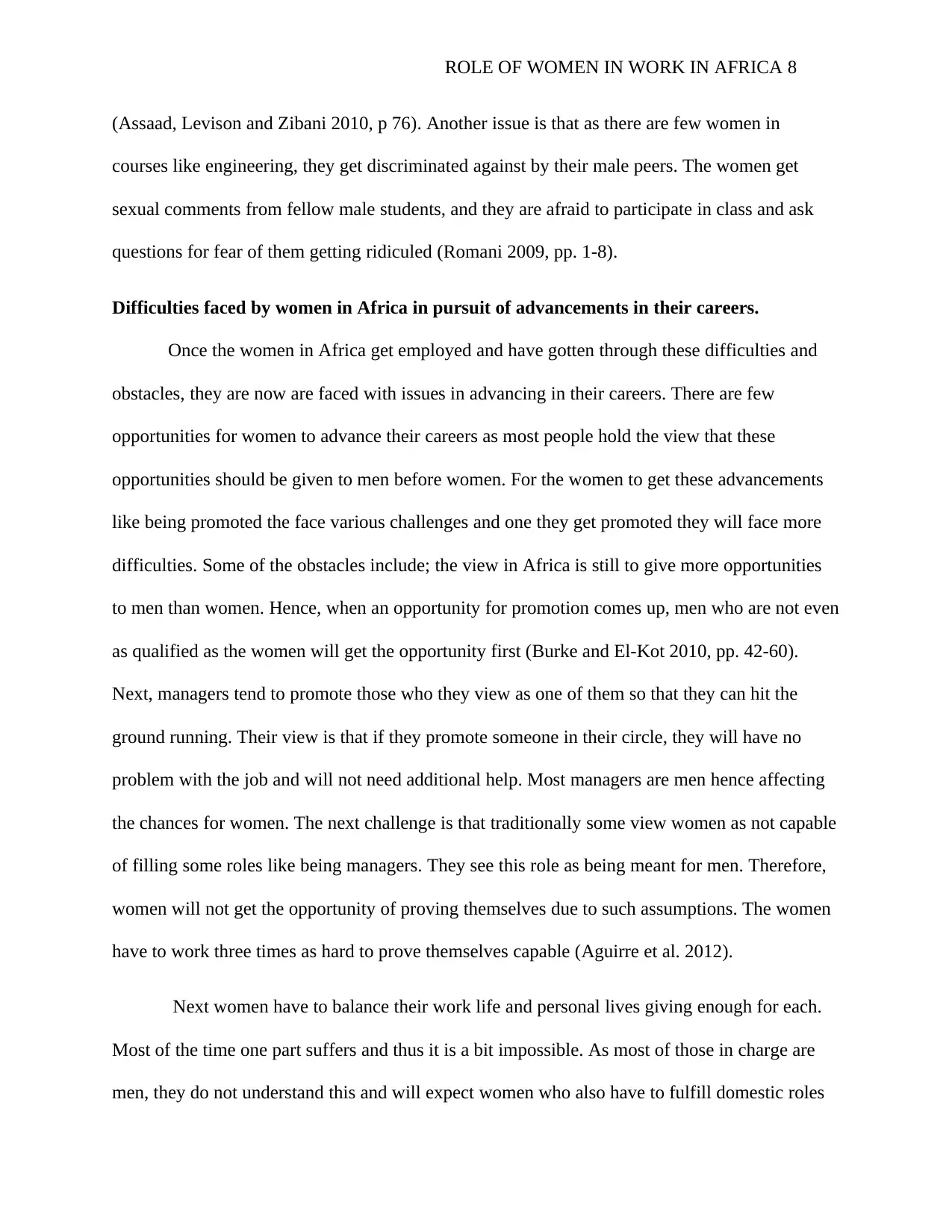
ROLE OF WOMEN IN WORK IN AFRICA 8
(Assaad, Levison and Zibani 2010, p 76). Another issue is that as there are few women in
courses like engineering, they get discriminated against by their male peers. The women get
sexual comments from fellow male students, and they are afraid to participate in class and ask
questions for fear of them getting ridiculed (Romani 2009, pp. 1-8).
Difficulties faced by women in Africa in pursuit of advancements in their careers.
Once the women in Africa get employed and have gotten through these difficulties and
obstacles, they are now are faced with issues in advancing in their careers. There are few
opportunities for women to advance their careers as most people hold the view that these
opportunities should be given to men before women. For the women to get these advancements
like being promoted the face various challenges and one they get promoted they will face more
difficulties. Some of the obstacles include; the view in Africa is still to give more opportunities
to men than women. Hence, when an opportunity for promotion comes up, men who are not even
as qualified as the women will get the opportunity first (Burke and El-Kot 2010, pp. 42-60).
Next, managers tend to promote those who they view as one of them so that they can hit the
ground running. Their view is that if they promote someone in their circle, they will have no
problem with the job and will not need additional help. Most managers are men hence affecting
the chances for women. The next challenge is that traditionally some view women as not capable
of filling some roles like being managers. They see this role as being meant for men. Therefore,
women will not get the opportunity of proving themselves due to such assumptions. The women
have to work three times as hard to prove themselves capable (Aguirre et al. 2012).
Next women have to balance their work life and personal lives giving enough for each.
Most of the time one part suffers and thus it is a bit impossible. As most of those in charge are
men, they do not understand this and will expect women who also have to fulfill domestic roles
(Assaad, Levison and Zibani 2010, p 76). Another issue is that as there are few women in
courses like engineering, they get discriminated against by their male peers. The women get
sexual comments from fellow male students, and they are afraid to participate in class and ask
questions for fear of them getting ridiculed (Romani 2009, pp. 1-8).
Difficulties faced by women in Africa in pursuit of advancements in their careers.
Once the women in Africa get employed and have gotten through these difficulties and
obstacles, they are now are faced with issues in advancing in their careers. There are few
opportunities for women to advance their careers as most people hold the view that these
opportunities should be given to men before women. For the women to get these advancements
like being promoted the face various challenges and one they get promoted they will face more
difficulties. Some of the obstacles include; the view in Africa is still to give more opportunities
to men than women. Hence, when an opportunity for promotion comes up, men who are not even
as qualified as the women will get the opportunity first (Burke and El-Kot 2010, pp. 42-60).
Next, managers tend to promote those who they view as one of them so that they can hit the
ground running. Their view is that if they promote someone in their circle, they will have no
problem with the job and will not need additional help. Most managers are men hence affecting
the chances for women. The next challenge is that traditionally some view women as not capable
of filling some roles like being managers. They see this role as being meant for men. Therefore,
women will not get the opportunity of proving themselves due to such assumptions. The women
have to work three times as hard to prove themselves capable (Aguirre et al. 2012).
Next women have to balance their work life and personal lives giving enough for each.
Most of the time one part suffers and thus it is a bit impossible. As most of those in charge are
men, they do not understand this and will expect women who also have to fulfill domestic roles
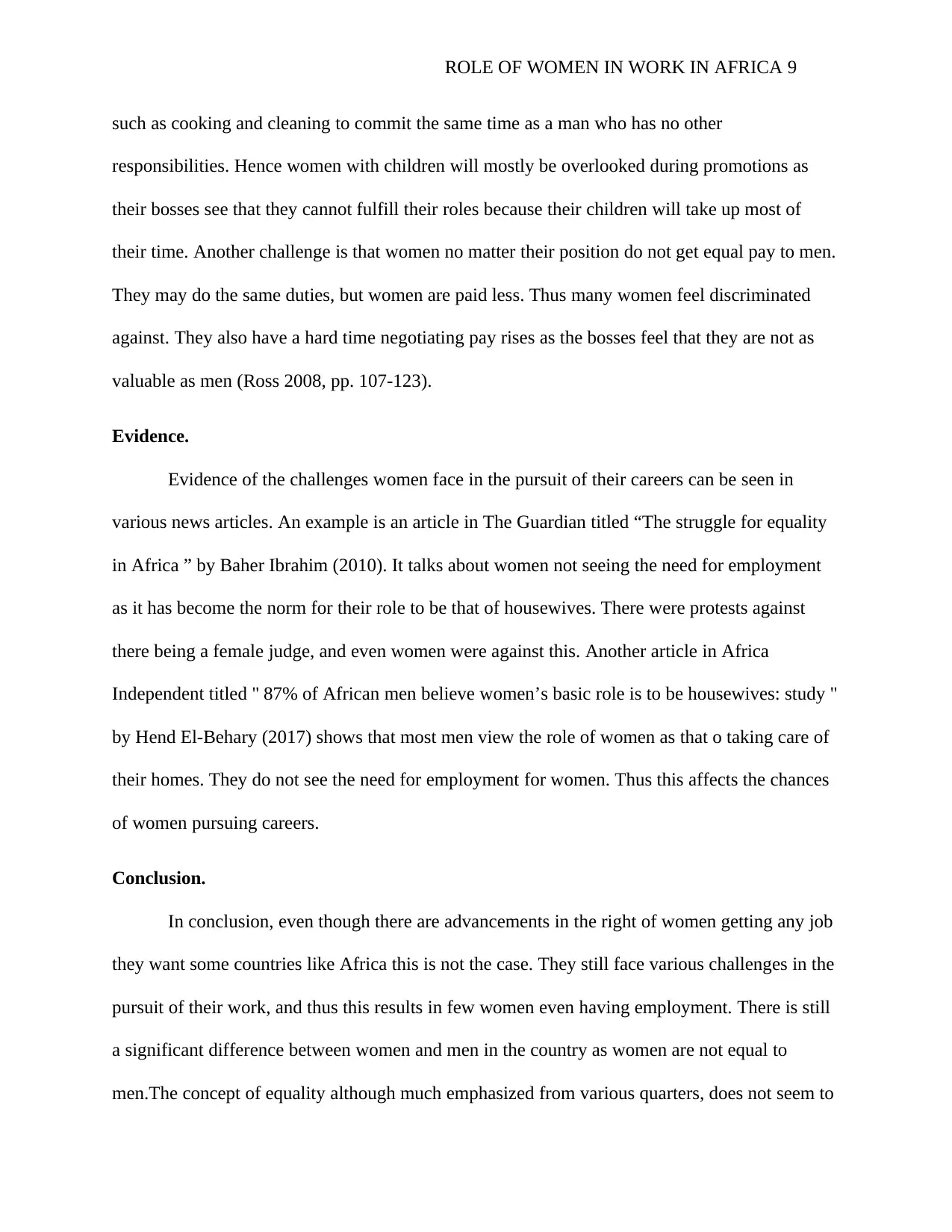
ROLE OF WOMEN IN WORK IN AFRICA 9
such as cooking and cleaning to commit the same time as a man who has no other
responsibilities. Hence women with children will mostly be overlooked during promotions as
their bosses see that they cannot fulfill their roles because their children will take up most of
their time. Another challenge is that women no matter their position do not get equal pay to men.
They may do the same duties, but women are paid less. Thus many women feel discriminated
against. They also have a hard time negotiating pay rises as the bosses feel that they are not as
valuable as men (Ross 2008, pp. 107-123).
Evidence.
Evidence of the challenges women face in the pursuit of their careers can be seen in
various news articles. An example is an article in The Guardian titled “The struggle for equality
in Africa ” by Baher Ibrahim (2010). It talks about women not seeing the need for employment
as it has become the norm for their role to be that of housewives. There were protests against
there being a female judge, and even women were against this. Another article in Africa
Independent titled " 87% of African men believe women’s basic role is to be housewives: study "
by Hend El-Behary (2017) shows that most men view the role of women as that o taking care of
their homes. They do not see the need for employment for women. Thus this affects the chances
of women pursuing careers.
Conclusion.
In conclusion, even though there are advancements in the right of women getting any job
they want some countries like Africa this is not the case. They still face various challenges in the
pursuit of their work, and thus this results in few women even having employment. There is still
a significant difference between women and men in the country as women are not equal to
men.The concept of equality although much emphasized from various quarters, does not seem to
such as cooking and cleaning to commit the same time as a man who has no other
responsibilities. Hence women with children will mostly be overlooked during promotions as
their bosses see that they cannot fulfill their roles because their children will take up most of
their time. Another challenge is that women no matter their position do not get equal pay to men.
They may do the same duties, but women are paid less. Thus many women feel discriminated
against. They also have a hard time negotiating pay rises as the bosses feel that they are not as
valuable as men (Ross 2008, pp. 107-123).
Evidence.
Evidence of the challenges women face in the pursuit of their careers can be seen in
various news articles. An example is an article in The Guardian titled “The struggle for equality
in Africa ” by Baher Ibrahim (2010). It talks about women not seeing the need for employment
as it has become the norm for their role to be that of housewives. There were protests against
there being a female judge, and even women were against this. Another article in Africa
Independent titled " 87% of African men believe women’s basic role is to be housewives: study "
by Hend El-Behary (2017) shows that most men view the role of women as that o taking care of
their homes. They do not see the need for employment for women. Thus this affects the chances
of women pursuing careers.
Conclusion.
In conclusion, even though there are advancements in the right of women getting any job
they want some countries like Africa this is not the case. They still face various challenges in the
pursuit of their work, and thus this results in few women even having employment. There is still
a significant difference between women and men in the country as women are not equal to
men.The concept of equality although much emphasized from various quarters, does not seem to
⊘ This is a preview!⊘
Do you want full access?
Subscribe today to unlock all pages.

Trusted by 1+ million students worldwide
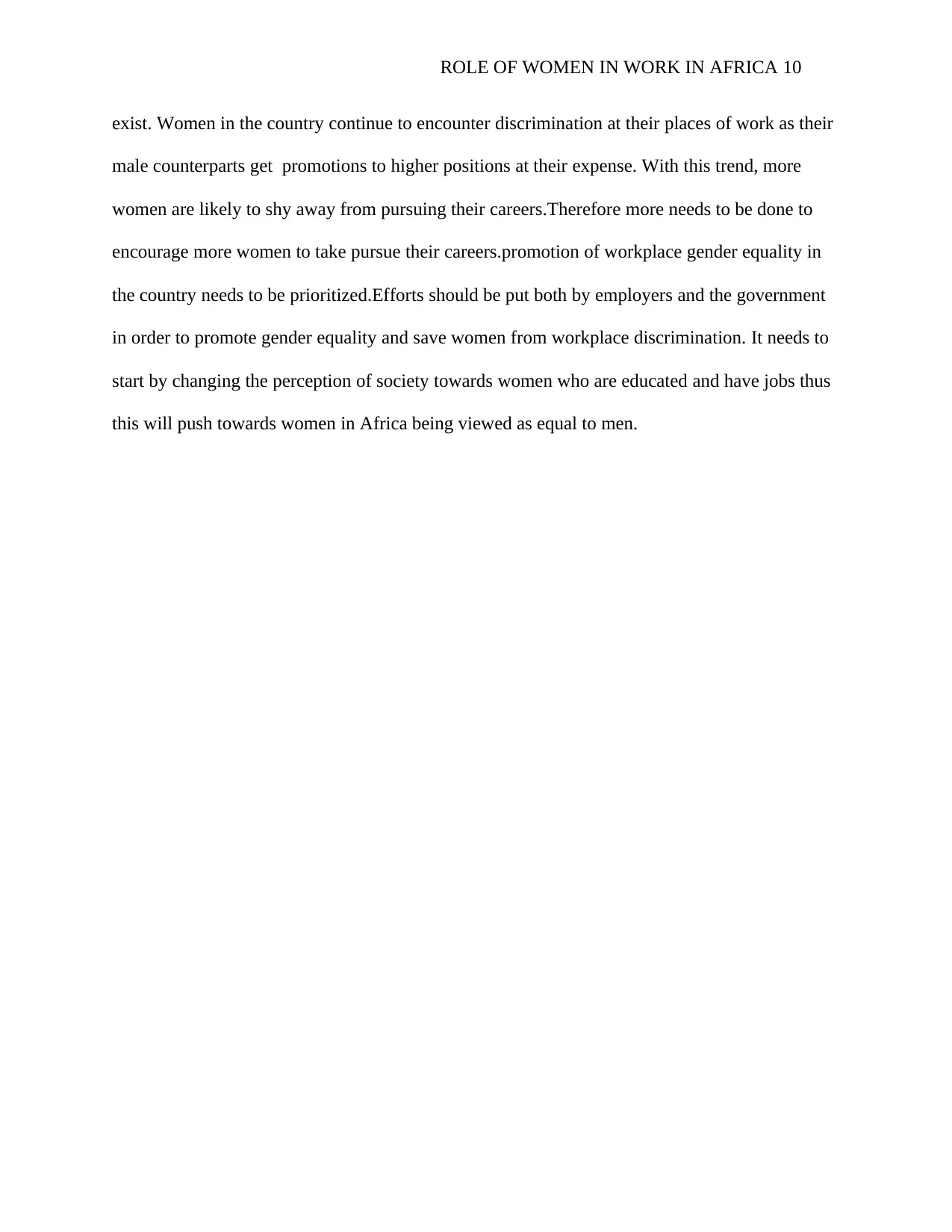
ROLE OF WOMEN IN WORK IN AFRICA 10
exist. Women in the country continue to encounter discrimination at their places of work as their
male counterparts get promotions to higher positions at their expense. With this trend, more
women are likely to shy away from pursuing their careers.Therefore more needs to be done to
encourage more women to take pursue their careers.promotion of workplace gender equality in
the country needs to be prioritized.Efforts should be put both by employers and the government
in order to promote gender equality and save women from workplace discrimination. It needs to
start by changing the perception of society towards women who are educated and have jobs thus
this will push towards women in Africa being viewed as equal to men.
exist. Women in the country continue to encounter discrimination at their places of work as their
male counterparts get promotions to higher positions at their expense. With this trend, more
women are likely to shy away from pursuing their careers.Therefore more needs to be done to
encourage more women to take pursue their careers.promotion of workplace gender equality in
the country needs to be prioritized.Efforts should be put both by employers and the government
in order to promote gender equality and save women from workplace discrimination. It needs to
start by changing the perception of society towards women who are educated and have jobs thus
this will push towards women in Africa being viewed as equal to men.
Paraphrase This Document
Need a fresh take? Get an instant paraphrase of this document with our AI Paraphraser
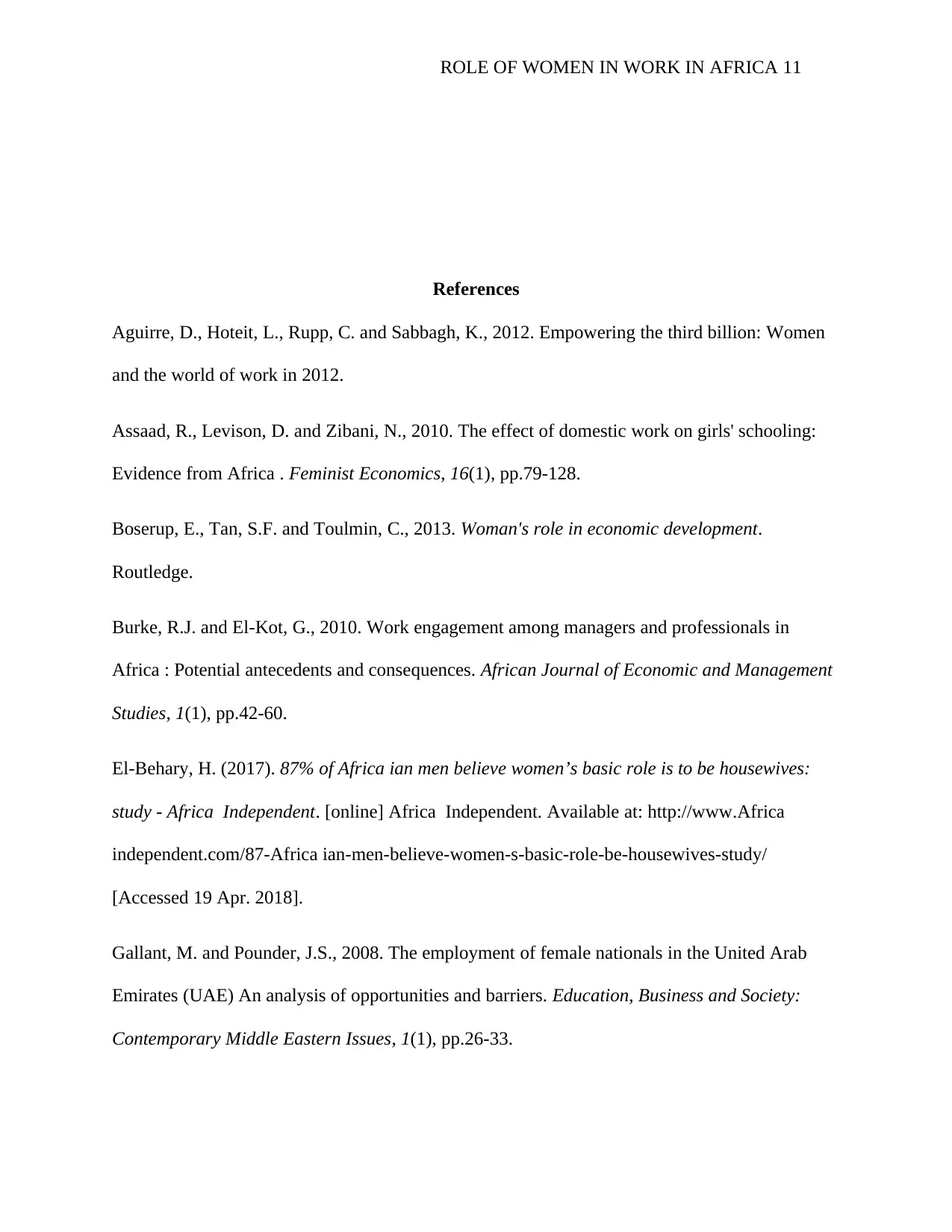
ROLE OF WOMEN IN WORK IN AFRICA 11
References
Aguirre, D., Hoteit, L., Rupp, C. and Sabbagh, K., 2012. Empowering the third billion: Women
and the world of work in 2012.
Assaad, R., Levison, D. and Zibani, N., 2010. The effect of domestic work on girls' schooling:
Evidence from Africa . Feminist Economics, 16(1), pp.79-128.
Boserup, E., Tan, S.F. and Toulmin, C., 2013. Woman's role in economic development.
Routledge.
Burke, R.J. and El-Kot, G., 2010. Work engagement among managers and professionals in
Africa : Potential antecedents and consequences. African Journal of Economic and Management
Studies, 1(1), pp.42-60.
El-Behary, H. (2017). 87% of Africa ian men believe women’s basic role is to be housewives:
study - Africa Independent. [online] Africa Independent. Available at: http://www.Africa
independent.com/87-Africa ian-men-believe-women-s-basic-role-be-housewives-study/
[Accessed 19 Apr. 2018].
Gallant, M. and Pounder, J.S., 2008. The employment of female nationals in the United Arab
Emirates (UAE) An analysis of opportunities and barriers. Education, Business and Society:
Contemporary Middle Eastern Issues, 1(1), pp.26-33.
References
Aguirre, D., Hoteit, L., Rupp, C. and Sabbagh, K., 2012. Empowering the third billion: Women
and the world of work in 2012.
Assaad, R., Levison, D. and Zibani, N., 2010. The effect of domestic work on girls' schooling:
Evidence from Africa . Feminist Economics, 16(1), pp.79-128.
Boserup, E., Tan, S.F. and Toulmin, C., 2013. Woman's role in economic development.
Routledge.
Burke, R.J. and El-Kot, G., 2010. Work engagement among managers and professionals in
Africa : Potential antecedents and consequences. African Journal of Economic and Management
Studies, 1(1), pp.42-60.
El-Behary, H. (2017). 87% of Africa ian men believe women’s basic role is to be housewives:
study - Africa Independent. [online] Africa Independent. Available at: http://www.Africa
independent.com/87-Africa ian-men-believe-women-s-basic-role-be-housewives-study/
[Accessed 19 Apr. 2018].
Gallant, M. and Pounder, J.S., 2008. The employment of female nationals in the United Arab
Emirates (UAE) An analysis of opportunities and barriers. Education, Business and Society:
Contemporary Middle Eastern Issues, 1(1), pp.26-33.
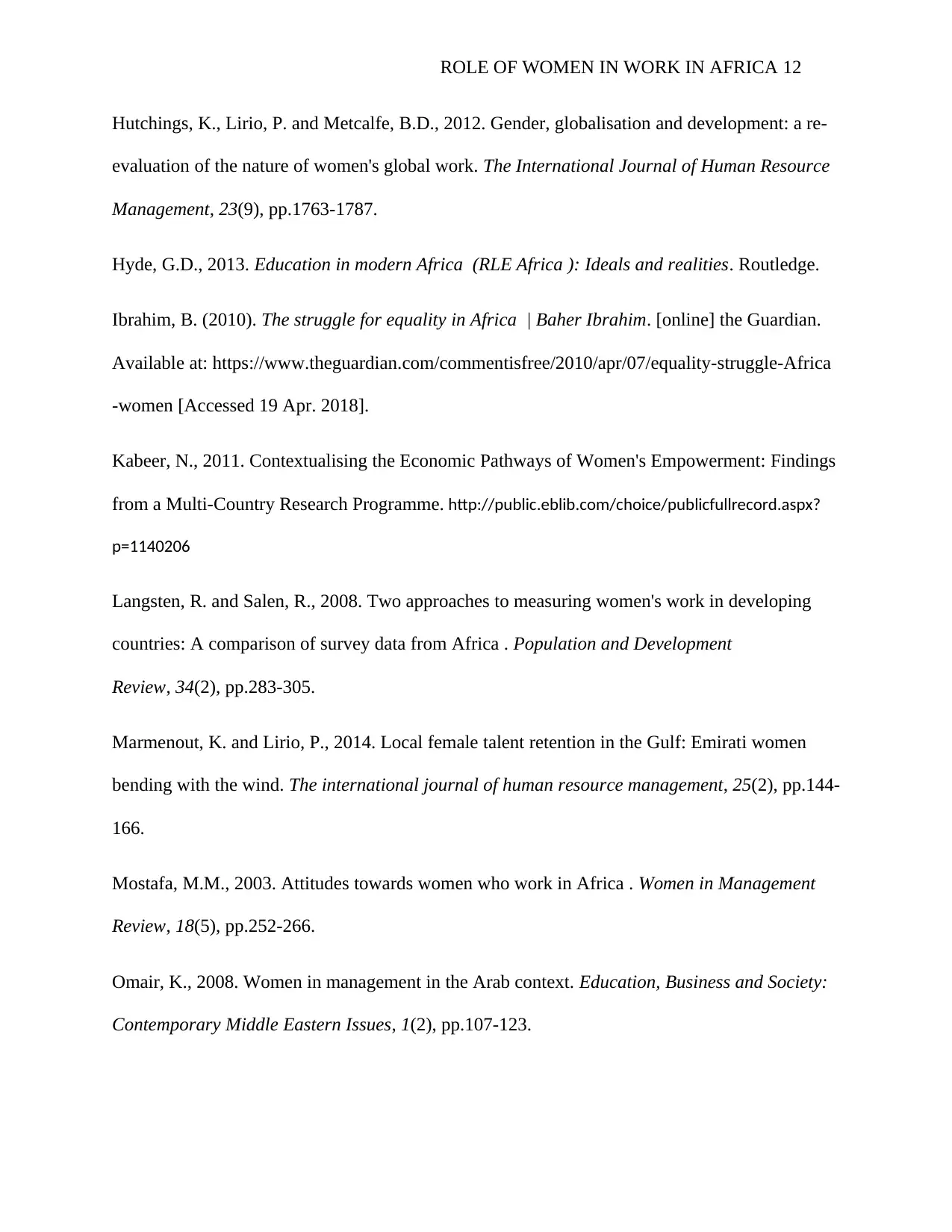
ROLE OF WOMEN IN WORK IN AFRICA 12
Hutchings, K., Lirio, P. and Metcalfe, B.D., 2012. Gender, globalisation and development: a re-
evaluation of the nature of women's global work. The International Journal of Human Resource
Management, 23(9), pp.1763-1787.
Hyde, G.D., 2013. Education in modern Africa (RLE Africa ): Ideals and realities. Routledge.
Ibrahim, B. (2010). The struggle for equality in Africa | Baher Ibrahim. [online] the Guardian.
Available at: https://www.theguardian.com/commentisfree/2010/apr/07/equality-struggle-Africa
-women [Accessed 19 Apr. 2018].
Kabeer, N., 2011. Contextualising the Economic Pathways of Women's Empowerment: Findings
from a Multi-Country Research Programme. http://public.eblib.com/choice/publicfullrecord.aspx?
p=1140206
Langsten, R. and Salen, R., 2008. Two approaches to measuring women's work in developing
countries: A comparison of survey data from Africa . Population and Development
Review, 34(2), pp.283-305.
Marmenout, K. and Lirio, P., 2014. Local female talent retention in the Gulf: Emirati women
bending with the wind. The international journal of human resource management, 25(2), pp.144-
166.
Mostafa, M.M., 2003. Attitudes towards women who work in Africa . Women in Management
Review, 18(5), pp.252-266.
Omair, K., 2008. Women in management in the Arab context. Education, Business and Society:
Contemporary Middle Eastern Issues, 1(2), pp.107-123.
Hutchings, K., Lirio, P. and Metcalfe, B.D., 2012. Gender, globalisation and development: a re-
evaluation of the nature of women's global work. The International Journal of Human Resource
Management, 23(9), pp.1763-1787.
Hyde, G.D., 2013. Education in modern Africa (RLE Africa ): Ideals and realities. Routledge.
Ibrahim, B. (2010). The struggle for equality in Africa | Baher Ibrahim. [online] the Guardian.
Available at: https://www.theguardian.com/commentisfree/2010/apr/07/equality-struggle-Africa
-women [Accessed 19 Apr. 2018].
Kabeer, N., 2011. Contextualising the Economic Pathways of Women's Empowerment: Findings
from a Multi-Country Research Programme. http://public.eblib.com/choice/publicfullrecord.aspx?
p=1140206
Langsten, R. and Salen, R., 2008. Two approaches to measuring women's work in developing
countries: A comparison of survey data from Africa . Population and Development
Review, 34(2), pp.283-305.
Marmenout, K. and Lirio, P., 2014. Local female talent retention in the Gulf: Emirati women
bending with the wind. The international journal of human resource management, 25(2), pp.144-
166.
Mostafa, M.M., 2003. Attitudes towards women who work in Africa . Women in Management
Review, 18(5), pp.252-266.
Omair, K., 2008. Women in management in the Arab context. Education, Business and Society:
Contemporary Middle Eastern Issues, 1(2), pp.107-123.
⊘ This is a preview!⊘
Do you want full access?
Subscribe today to unlock all pages.

Trusted by 1+ million students worldwide
1 out of 13
Related Documents
Your All-in-One AI-Powered Toolkit for Academic Success.
+13062052269
info@desklib.com
Available 24*7 on WhatsApp / Email
![[object Object]](/_next/static/media/star-bottom.7253800d.svg)
Unlock your academic potential
Copyright © 2020–2025 A2Z Services. All Rights Reserved. Developed and managed by ZUCOL.





